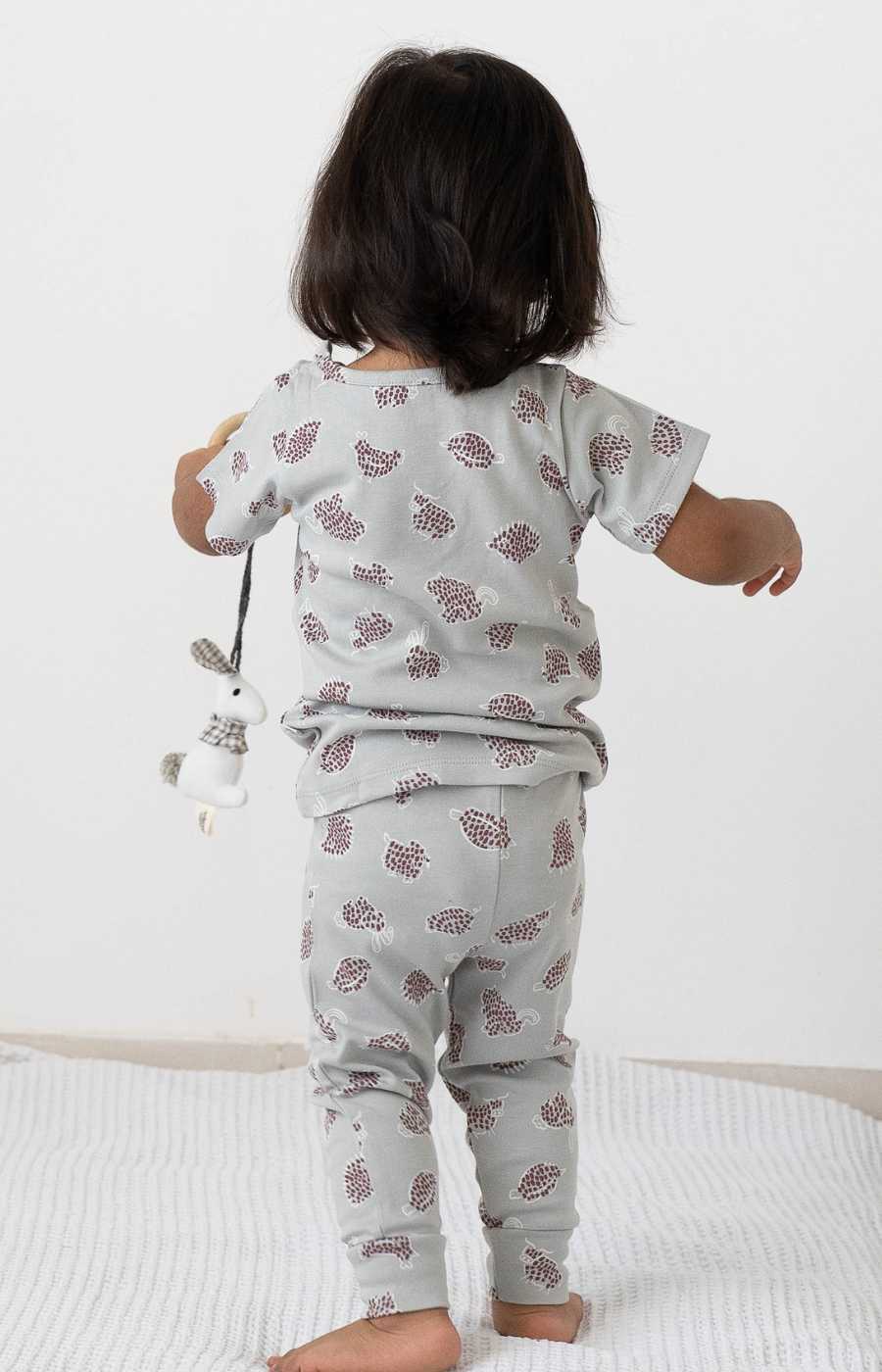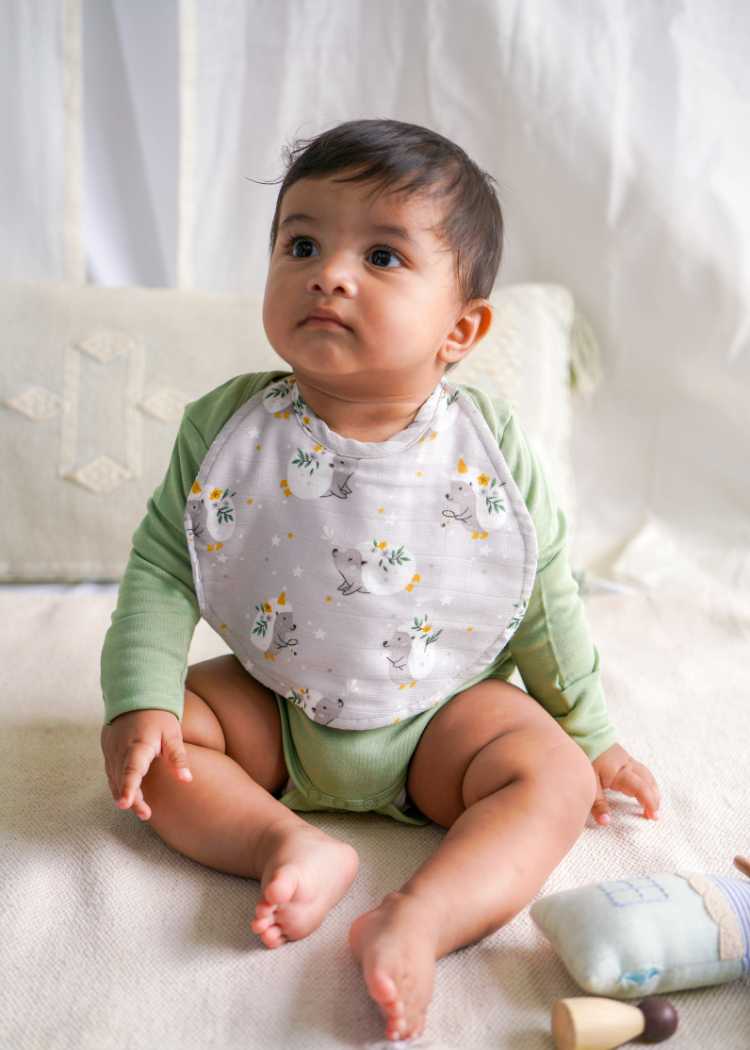Key Takeaways
-
Not all sleep should be uninterrupted. Sometimes, waking a sleeping baby is necessary to support feeding and healthy growth.
-
Learn how to wake a newborn to feed using gentle techniques and your intuitions.
-
Pediatricians recommend maintaining a consistent baby sleep schedule for newborns, even if it means waking them in the morning.
-
Always consult with your doctor about your baby’s newborn feeding schedule and sleep needs to know when to wake up your baby to feed
In This Article
- Key Takeaways
- In This Article
- Introduction
- Science Of Baby Sleep Cycle
- Is It Okay to Wake a Sleeping Baby?
- When You Should Wake a Sleeping Baby
- When You Should Not Wake a Sleeping Baby
- Tips for Waking a Baby Gently
- Understanding Day vs. Night Sleep
- Pediatric Sleep Recommendations
- Establishing a Bedtime Routine
- Creating a Sleep-Friendly Environment
- Respecting Different Parenting Choices
- Conclusion
- Frequently Asked Questions
Introduction
As a new mother, I was always told by my mom, “You should never wake a sleeping baby”, which left me with tons of questions and uncertainty, like whether to wake the baby up or not. Are you a new mom with similar questions, too? Worry not! To save you time and energy, I decided to do my own research to learn more, which I would like to share with every new mother so they don’t have to live with dilemmas all the time.
In this blog, I will take you through topics like, Is it ok to wake a sleeping baby, how to wake a baby gently, when is it safe to let a baby sleep through the night, newborn feeding schedule and more.
Science Of Baby Sleep Cycle: Why Sleep Is Crucial for Infants
[1]Babies don't have adult-like sleep patterns. They have shorter sleep cycles (ranging from 10 minutes to 3 hours) and spend more time in REM (rapid eye movements) and N-REM (non-REM) sleep, which is critical for brain development. Frequent awakenings are biologically typical in the early months.
Here’s a quick chart showing typical sleep needs at different stages:
|
Age |
Average total sleep hours |
Average daytime naps |
Average daytime sleep |
|
0–2 months |
15–16+ hours |
3–5 naps |
7–8 hours |
|
3–5 months |
14–16 hours |
3–4 naps |
4–6 hours |
|
6–8 months |
14 hours |
2–3 naps |
3–4 hours |
|
9–12 months |
14 hours |
2 naps |
3–4 hours |
Is It Okay to Wake a Sleeping Baby?
It’s crucial to understand that while sleep is necessary for a baby’s growth and development, there are many occasions when waking a baby is not only okay but also necessary. No matter how heartbreaking it looks to wake up a snuggled baby at times, it’s of the utmost importance to know when and why to gently wake your baby to support their health, feeding schedule, and overall well-being.
It’s necessary to strike the right balance between letting them rest and ensuring their basic needs are met for overall healthy development. It also took me some time to figure out how to find this balance, but eventually, every mother understands it too.
When You Should Wake a Sleeping Baby
Understanding these reasons helped me to make informed choices that support healthy sleep and development. As a mother, I need to wake the child to ensure their feed, has a daily routine and whether or not the diaper is clean.
1. For feeding:
Newborns in the first few weeks may need to be woken every 2–4 hours to feed, especially if they’re underweight or not gaining enough.
2. To help with their day-night confusion:
Waking a baby during long daytime naps can help them learn the difference between day and night.
3. For diaper changes:
To prevent diaper rashes, discomfort and risk of infection, it’s a good idea to wake the baby and change the soiled diaper.
4. To establish a routine:
Gently waking a baby at consistent times can help set a regular sleep and feeding schedule over time.
5. To set nap time limits:
Letting naps go too long, especially late in the day, can interfere with overnight sleep quality.
6. For Medical Reasons
If your baby needs to be given oral medication, you should wake them up.
I used Cocoon Care’s products like baby jhabla, baby blanket, baby nightsuit, and cloth nappies. These new baby clothes offered comfort to my baby and simplified my daily feeding routine.
When You Should Not Wake a Sleeping Baby
Many times, you can avoid waking them up as well because sleep is necessary for their growth and development. Some instances when I let my baby sleep in:
1. If your baby is growing well
If your baby is eating enough and gaining weight, it’s okay to let them sleep longer, especially at night.
2. While sleeping at night
Once they know the difference between day and night, try not to wake them. Night sleep helps build a good routine.
3. When sick and resting
Sleep helps babies heal. If they’re not in pain or needing care, let them rest.
4. After vaccination
Babies often feel sleepy after vaccines. It’s normal, and sleep helps their little bodies recover.
5. After a full feed
If they’ve eaten well and are peacefully asleep, no need to wake them just to feed more.
6. During light sleep
Babies sometimes move in their sleep. Don’t rush to wake them as they might go back to sleep on their own.
Tips for Waking a Baby Gently
Always take your time — a slow, loving wake-up helps your baby feel safe and cared for. Here are some things that I learnt with the course of time that helped me wake my baby up without startling.
1. Open the curtains
Let natural light come into the room, as soft light signals that it’s time to wake up.
2. Gently rub or pat
Touch their back, tummy, arms, or feet softly.
3. Change their diaper
This often wakes babies naturally and gives them a fresh start to the day while ensuring hygiene is maintained.
4. Talk or sing softly
Use a calm, happy voice as hearing the mother’s loving voice can gently pull them out of sleep.
5. Offer skin-to-skin contact
Laying your baby against your skin can help wake them gently, especially during feeding time.
6. Try undressing a layer
If they’re bundled up, removing a layer (like a baby blanket or hat) can help wake them without startling.
I personally used Cocoon Care’s newborn baby sleep pod as it gives utmost comfort, is breathable, environment-friendly, odour-free and hypoallergenic. It also helped my baby sleep better.
Understanding Day vs. Night Sleep
Newborns don't have set sleep-wake cycles. For the first several weeks, their day and night sleep might feel muddled. That is typical! Your baby's circadian rhythm, or natural sleep-wake cycle, gradually develops, allowing them to sleep for extended periods at night and remain attentive throughout the day. Understanding this natural process will alleviate your concerns and set you up with realistic expectations from the outset.
Newborns wake up frequently during the night, usually because they need to be fed or changed. Around 3 months of age, babies may begin to grasp the rhythms of day and night.
You may help your infant sleep better at night by exposing them to light and gently interacting with them during the day. You may also create a dark, calm environment at night.
Pediatric Sleep Recommendations
When it comes to newborn sleep, doctors and sleep experts frequently sing the same lullaby: Safety first. The American Academy of Pediatrics (AAP) [2] recommends placing newborns on their backs in a secure, solid sleep environment. Experts also advocate minimising overstimulation before sleep and supporting rituals that help newborns differentiate between day and night.
These principles are more than simply regulations; they are your baby's greatest opportunity for good, safe sleep.
Establishing a Bedtime Routine
Babies enjoy predictability, and a soothing bedtime ritual is like a comfortable invitation to dreamland.
-
Develop a Calming Routine: Calming activities, such as a warm bath, soothing lullabies, or a quiet reading, can give a signal to your baby's brain that it is time to relax.
-
Keep It Short and Sweet: You should aim for 20–30 minutes, enough to soothe without overstimulating.
-
Consistency is Key: By doing the same steps at the same time every night, you build a comforting sense of security for the baby.
-
Avoid Stimulation: To avoid stimulation, turn off screens and keep noise low to help your baby’s brain slow down
Creating a Sleep-Friendly Environment
Setting a peaceful sleep involves more than simply routines; the environment itself has a significant impact on your baby's ability to fall and remain asleep. A tranquil, pleasant setting might communicate to your child that it's time to unwind and slumber.
-
Darkness is Your Friend: Blackout curtains or dim lights can send the message to your baby that it’s nighttime.
-
Minimise Noise: By playing soft white noise or just by a gentle fan, you can drown out distractions by avoiding sudden sounds.
-
Comfortable and Safe Sleep Space: Make sure your baby is placed in a safe space like a crib or a baby sleeping bag.
-
Optimal Temperature: The room temperature should be between 24-26°C to prevent overheating and promote restful sleep.
-
Reduce Distractions: A clutter-free crib helps your baby focus on sleeping, not playing.
Respecting Different Parenting Choices
We understand that every parent is different and has different parenting choices. Some families like co-sleeping, while others value autonomous sleep. The most important thing is safety and what feels right for you and your kid. There is no one-size-fits-all solution here; just support, love, and the knowledge that each infant is unique. Trust your intuition and, if needed, seek professional assistance to guide your decisions.
Conclusion
Remember, teaching your infant to sleep effectively is a process, not a single step. With patience, a calm bedtime ritual, and a sleep-friendly atmosphere, you're establishing the groundwork for healthy sleep habits that benefit the entire household. Above all, realise that you're doing an excellent job navigating this important part of your life.
Sweet dreams ahead!
Frequently Asked Questions
1. Is it good to wake up a sleeping baby?
Yes, sometimes it's necessary to know how to wake up a baby. For example, during the newborn stage, waking helps ensure they get enough nutrition..
2. How to wake a newborn to feed without upsetting them?
Use gentle techniques like undressing them slightly, wiping their feet with a damp cloth, or changing their baby swaddle.
3. How to wake up a sleeping baby after a long nap?
Dim the lights gradually, speak softly, and gently rub their back. These cues help with how to wake up a sleeping baby without distressing them.
4. When is it okay to let a baby sleep through the night?
Once a baby reaches a healthy weight and is around 3–4 months old, it's generally safe to let a baby sleep through the night. Always check with your pediatrician for personalised guidance.
5. How long should a newborn sleep without eating?
Most newborns sleep 2–4 hours at a time. Until around 8 weeks, they shouldn’t go more than 4 hours without feeding, day or night.
6. How to wake up a newborn baby gently?
Loosen their baby blanket, hold them upright, and softly speak their name. These are all part of how to wake up a newborn baby without triggering full alertness too quickly.
7. Why would you need to wake a baby during nap time?
Sometimes naps can run too long and disrupt the bedtime routine. To maintain a healthy baby sleep schedule, you need to wake them up from long naps.
8. Can a newborn sleep too long?
Yes, a newborn can sleep too long in the first few weeks, when consistent feeding is essential. If they sleep more than 4 hours at a stretch, it is best to wake them for feeding.
9. What happens if you don’t wake a baby to feed?
Many doctors advise waking babies per their newborn feeding schedule until nursing is well-established, as it could delay weight gain or affect hydration
10. Should I wake my baby up in the morning?
A consistent wake time supports the infant's sleep cycles and helps develop a predictable routine.
11. What are the signs that I shouldn’t wake a sleeping baby?
If your baby is sick, has had vaccinations, or has been overstimulated, rest might be more beneficial. Learn to read sleep cues and understand when not to wake a sleeping baby.
Citations
[1] https://childsleepspecialist.co.uk/blog/should-you-wake-a-sleeping-baby/
Related blogs
With Love, from Cocoon Care
Dear Parent,
No matter where you are, your baby deserves gentle beginnings and comforting care. At Cocooncare, we pour love into every stitch. From soft muslin swaddles to cozy sleep pods and thoughtfully made newborn clothing, our essentials hold your baby with the same tenderness as you do. You can find baby essentials on our website and also on Amazon, Firstcry, Myntra, Nykaafashion and DuckDuck baby.
Because every baby deserves to be cocooned in care.
About the author
Renu Agrawal, a devoted new mom and passionate advocate for gentle parenting, is the heart behind this blog. Inspired by her journey into motherhood, Renu’s writing is rooted in real-life experiences—the joys, challenges, and tiny triumphs of raising a newborn. With a deep belief in conscious, comforting care, she shares thoughtful insights, practical tips, and a mother’s instinctive wisdom to help other parents navigate the early days of babyhood. Through Cocoon Care, Renu brings together safe, sustainable, and soft essentials that every baby and parent deserves
Popular Searches
Bottom wear | Baby Clothes Online | Newborn Romper | Baby Gift Set | Sleep Essentials | Burp cloths | Baby Bibs Online | Nappy For Baby | Hooded Baby Towel | Baby Mittens | Baby Sleep Sack
















